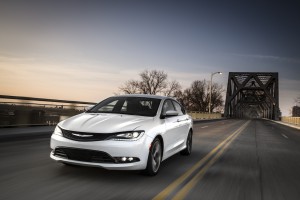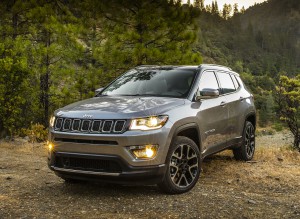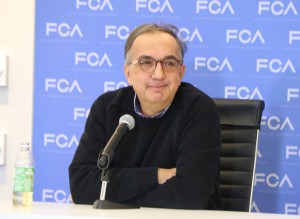Detroit’s smallest automaker closed the books on 2016 on a high note, delivering full-year earnings of $1.92 billion, after only marginally squeezing into the black the year before.
The turnaround should be good news to both Fiat Chrysler Automobiles investors and workers. The Euro-American automaker said it will nearly halve its net debt in the coming year. It also announced it would boost profit-sharing for U.S. hourly workers by 25%.
Net profits for all of 2016 jumped to 1.81 billion euros, or $1.92 billion, for FCA, which is officially registered in Amsterdam but operates one of its primary headquarters in the Detroit suburb of Auburn Hills. That compares with a meager 93 million Euro profit for all of 2015.
For the final quarter of 2016, FCA had a global net income of 409 million euros, or $438.8 million.
The improvement in the company’s fortunes came despite a decline in sales in the core U.S. market in 2016. That was primarily on the passenger car side of the business, and resulted in FCA’s decision to scrap its smallest models, the Chrysler 200 and Dodge Dart sedans.
The Illinois and Michigan plants that produced those models are currently closed as FCA converts them to expand production of key light truck models — reflecting the massive shift in the U.S. market from passenger cars to SUVs, crossovers, vans and pickups. The Sterling Heights, Michigan factory that had produced the Chrysler 200, for example, will begin rolling out the next-generation Ram 1500 pickup about a year from now.
(The Demon returns. Will this be the most powerful Dodge ever? Click Here to find out.)
FCA did benefit from stronger sales in a recovering European market – where it picked up another 0.4 percentage points of market share — as well as an expanded presence in China, the world’s largest motor vehicle market, where it is now building some of its Jeep models.
Jeep has more than doubled sales since the merger of Fiat and Chrysler in the wake of the Great Recession, and is now targeting global sales of at least 2 million SUVs and CUVs annually.
The automaker continues to face some challenges, however, not only with weak passenger car sales in North America, but with the slower-than-expected global expansion of its Alfa Romeo brand. FCA is betting it can boost Alfa’s fortunes in the coming year with the retail launch of its first-ever utility vehicle, the Stelvio.
Earnings for FCA’s other Italian luxury marque, Maserati, jumped last year, in part buoyed by that brand’s own new ute, the Levante.
Despite lower volume and weaker sales revenues in North America, FCA reported that profit margins in the U.S. and Canada increased a full percentage point, to 7.4%. Margins were boosted by a richer vehicle mix, a growing number of buyers opting for high-line SUVs, such as the Jeep Grand Cherokee, and better-equipped versions of the Ram pickups.
How FCA will fare in 2017 is far from clear. The automaker is in the midst of key product changeovers, including the two car plants being converted to trucks, as well as a factory in Toledo, Ohio being updated for an all-new version of the long-popular Jeep Wrangler.
Industry analysts are also concerned that overall U.S. sales could dip slightly after three consecutive record years that saw the industry collectively move 17.4 million vehicles in 2016. There are also concerns about the economic and trade policies of new President Donald Trump.
(Detroit CEOs square off with new president over trade, regs, taxes. Click Here for the latest.)
But the automaker is optimistic about moving forward with its goal of nearly cutting in half its current 2.5 billion, or $2.68 billion net debt in 2017. FCA Chief Executive Sergio Marchionne has promised to have the company cash positive by the end of 2018, the same year he is expected to retire.
Fiat Chrysler’s hourly workers will take home larger profit-sharing checks as a result of the stronger earnings – and a revised formula included in the new contract they negotiated in 2015. This year’s checks will come in at an average $5,000, up 25% from the $4,000 in profit-sharing for the year before. About 40,000 hourly workers in the U.S. are covered by the agreement, with checks set to be issued on February 17th.
(EPA formally accuses FCA of cheating on diesel emissions. Click Here for the story.)



